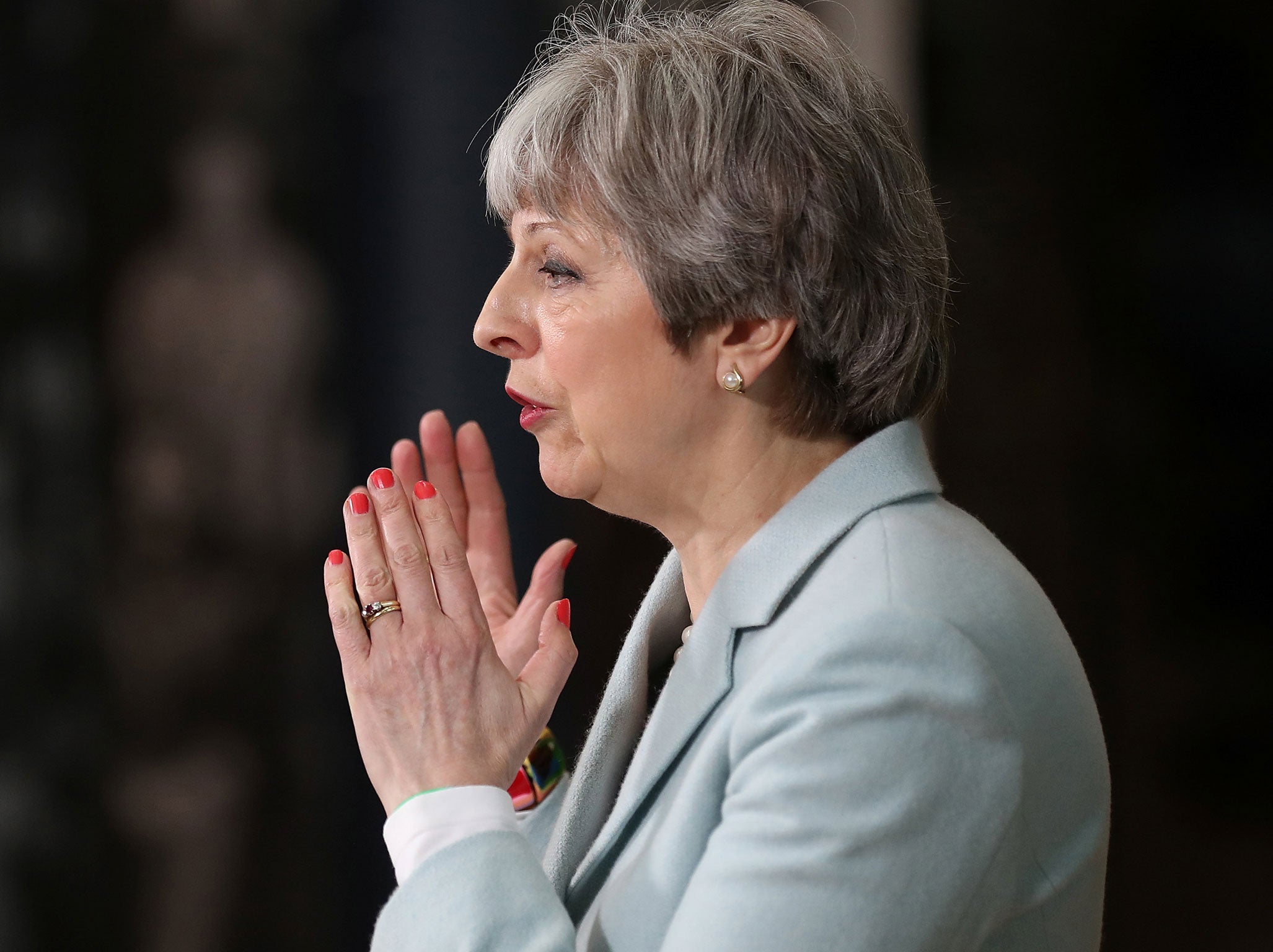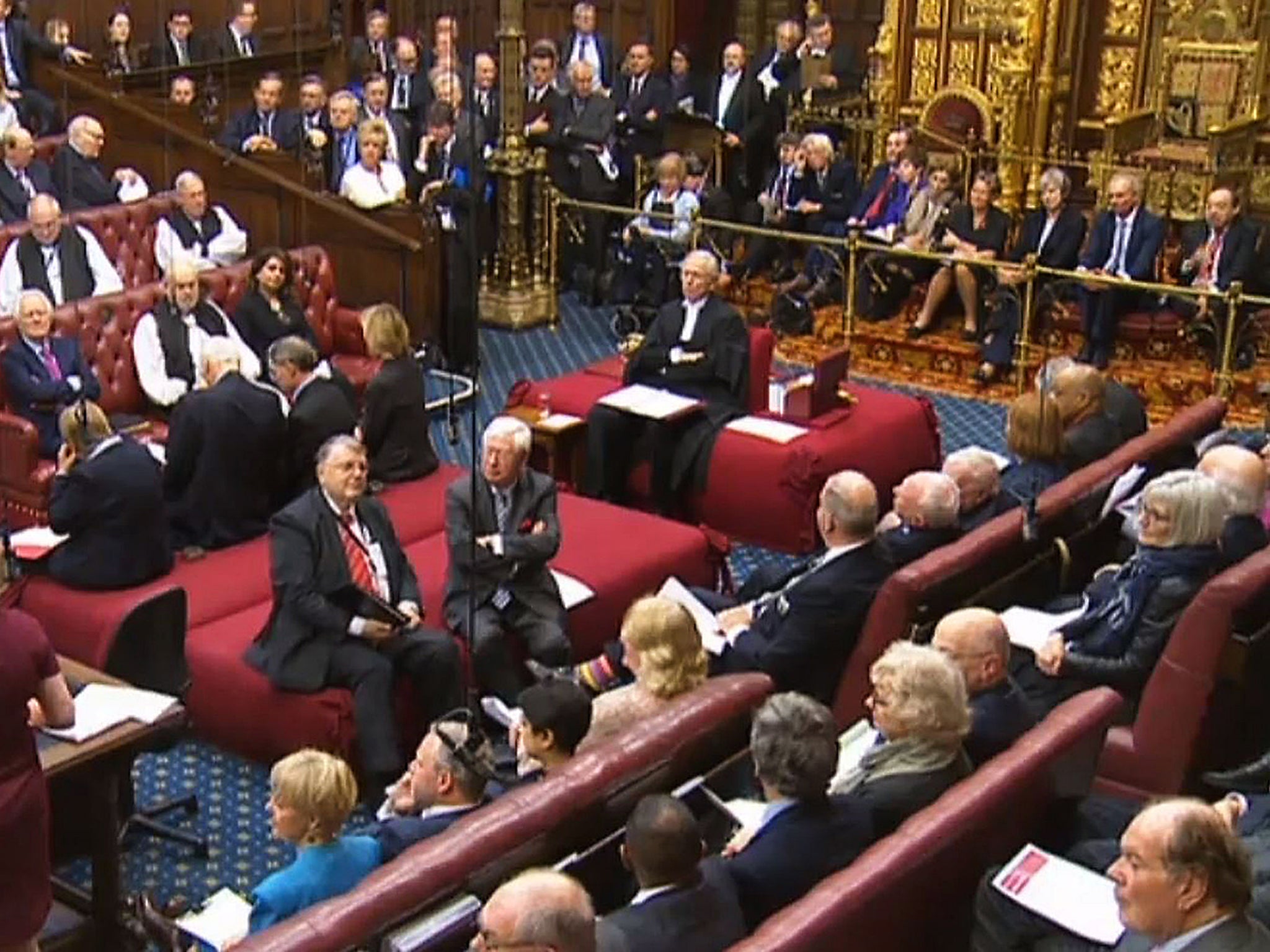Theresa May shelves plans to slash numbers in the House of Lords, claiming they need more 'careful thought'
Those demanding reform accuse the Prime Minister of 'ducking' her responsibilities

Theresa May has shelved plans to slash numbers in the House of Lords, claiming they need more “careful thought” despite decades of debate about reform.
Instead, the Prime Minister announced she will push a new group of Tories into the overcrowded chamber, while simultaneously claiming she is showing “restraint” with new appointments.
She said she would not necessarily follow the convention of giving peerages to all retiring holders of high office – police chiefs, senior judges and cabinet ministers.
But those demanding reform of the unelected chamber accused the Prime Minister of “ducking” her responsibility to push through change.
Ms May’s retreat from more radical plans comes as her ministers prepare on Wednesday to try and convince Lords to pass her critical piece of Brexit legislation.
Decades of attempts to reform the Lords have failed for political reasons, with a clear chance missed in 2012 due to squabbling between Liberal Democrats and Tory MPs.
As a result, the Lord Speaker’s Committee spent a year to October 2017 forming a plan to at least reduce the chamber’s size without the need to pass new laws – the idea being it would be easier for any PM to push through.
The committee published a 40-page report recommending slashing the number of peers to 600 in a decade, limiting any peer’s term to 15 years and a new “two-out, one in” system to accelerate a reduction in size.

But in a short section of a three-page letter to the committee published on Tuesday, Ms May said: “In my view the constitutional issues associated with the recommendations made by [the committee] ... require further careful thought and engagement, particularly with the House of Commons, before those steps can be progressed.”
She focussed the rest of her letter on the report’s call for prime ministers to show “restraint” in appointing new peers, arguing that she had already done so up to now.
Justifying her proposal to hand out further peerages, Ms May said: “Having nominated no political peers in the last Parliament – nor at dissolution as is normal practice – I am planning to propose a small list of new party political peers, which will be announced in the usual way in due course.”
Ms May went on to say that for the remainder of the Parliament she would “continue with the restraint which I have exercised to date”.
Her spokesman pointed out that numbers in the Lords had fallen on her watch from 812 to 792 already, thought this was due to retirements, deaths and two who have been removed for non-attendance.
Since entering Downing Street, Ms May has actually appointed more political peers, three in total, while Labour leader Jeremy Corbyn has appointed one and the Lib Dems none.
Ms May also said that party leaders should be encouraging older peers to retire, though Labour points out that the average age of its peers is older.
While the Lord Speaker, Lord Fowler, said the PM’s response was positive and meant plans were still “on course”, Darren Hughes, chief executive of the Electoral Reform Society, was less impressed.
He said: “There is a blatant contradiction in what the Prime Minister has said today. While we welcome her stated intention to reduce the size of the House of Lords, in reality she is merely paying lip service to the issue.
“Calling on parties to encourage their peers to resign is not enough – in fact, it misses the point.
“The most effective way to shrink the second chamber is to move to a slimmed-down, fairly elected chamber. Voters are tired of unaccountable Lords making laws on their behalf.”
A Labour spokesman said: “With this Conservative Government everything seems to be put off to some uncertain time in the future – Lords reform included.
“As well as ending the hereditary principle for good, we ultimately want to see an elected second chamber but Theresa May has ducked giving a proper response.”
Lib Dem MP Tom Brake said: “Theresa May had an opportunity to exert her authority and put some of the inactive peers to the sword, and reduce the size of the Lords.
“Instead, she has shied away from battle, and allowed the situation to fester. No doubt, while she plans her next appointments to the Upper House.”
Ministers will on Wednesday tentatively start the first stages of the EU (Withdrawal) Bill in the House of Lords, where the Tories do not have a majority, with peers from all sides pushing for amendments and Ms May on a tight schedule.
Join our commenting forum
Join thought-provoking conversations, follow other Independent readers and see their replies
Comments